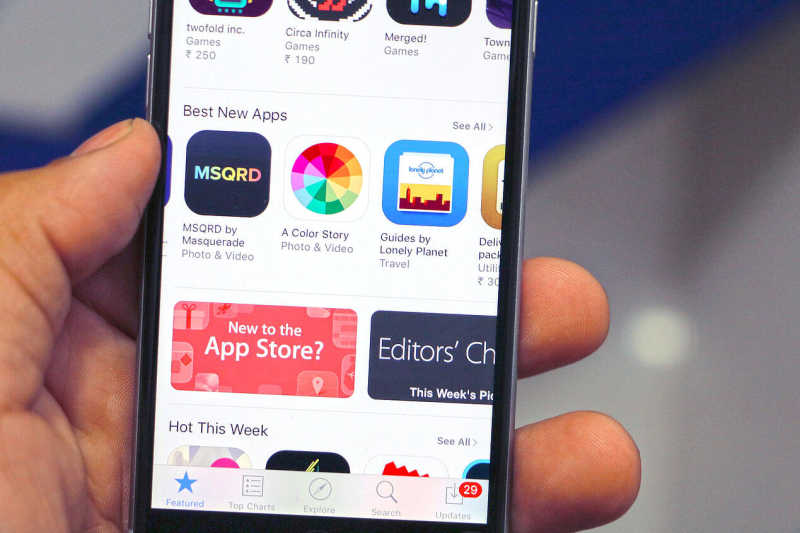No doubt at one point or another you will have encountered the term Search Engine Optimisation (SEO). SEO – the means by which an individual or company can optimise a website to rank higher in search engine results‚ based on specific search terms – is widely accepted to be a mandatory tool in the arsenal of any business looking to ensure visitation to a website. so‚ we hear you asking yourself‚ if we have Search Engine Optimisation that focuses on helping websites rank higher‚ surely can we have a similar offering for mobile apps? The answer is we most definitely can‚ and it’s generally referred to as App store Optimisaion‚ or ASO for short.
ASO – what and why?
So‚ App Store Optimisation exists‚ but what exactly is it and why is it an important piece of the mobile marketing puzzle? ASO is a similar concept to what we already have and accept with SEO‚ its website variant. The ASO process involves taking the necessary and available steps to optimise a mobile app‚ so that it appears as high as possible in an app store’s search results. The idea is to dramatically increase visibility of an application‚ and to ensure that it returns as high as possible when a potential user searches for a keyword or term that is relevant to the mobile app.
Essentially‚ SEO and ASO have exactly the same end goal in mind; to drive as much traffic as possible to a given page – which in the case of ASO is the application’s app store page via a user search – in order to present the app to the searcher and have him/her act upon that visibility.
![[object Object] [object Object]](http://images.ctfassets.net/o6514hijae09/24HUz4YGmHhCMr4LuuYHkj/79a540a66ba5fdf9f957d79bb575bac4/person-apple-laptop-notebook.jpg)
It’s reasonable to assume that driving more people to the app in the app store will equate to higher engagement rates and more users downloading the app to their devices. There are many ways to market an app and promote consumer engagement‚ but the important thing to remember is that app store searches still equate for the lion’s share of discoverability. A Forrester study has previously shown that 63% of apps are discovered via app store searches‚ highlighting just how important discoverability is.
Optimising your app
Now that we have an understanding of how important optimising an app can be for discoverability‚ how do we actually go about doing it‚ and what are the factors and considerations involved?
The two main factors involved in App Store Optimisation are the title of the app store page‚ and the keywords associated with the app. The main title of the app store page should contain the keyword that comes with the heaviest search traffic assigned to it.
That obviously means that there will be some initial research needed into keywords relevant to the application‚ narrowed down to one that has the heaviest weighting. Changing keyword frequently or including multiple keywords in the main title can often have detrimental effects‚ which highlights the importance of doing the necessary legwork prior to selecting a title for the app store page.
This leads nicely on to the keyword aspect of the equation‚ or more importantly‚ the keywords that are used in the app store page metadata. In order to improve the prominence of the app store page‚ with the intention of being ranked higher in mobile app searches‚ it’s vitally important to know and understand the keywords that are used most often by the app’s target demographic. This includes those potential consumers who are likely to be searching for an application that does what your app does.
![[object Object] [object Object]](http://images.ctfassets.net/o6514hijae09/NfbdWItPL8RuNm03cwbIW/fc1cfe85cc774aa3ad9197b3955a7ecc/15160297652_ccc6feafdd_z.webp)
Source: Flickr
As an example‚ the extremely popular Facebook for iOS application may have keywords like “social”‚ “networking”‚ “Facebook”‚ “Zuckeberg” or “timeline” attached to it‚ all of which are potential things that individuals may search for when looking for a social networking application of that nature. If your application has competitors‚ then it’s a very good idea to consistently search on a week-by-week basis to see how you rank in comparison to those other apps. That should give you a good understanding of whether or not changing keywords and the like is actually making a difference.
![[object Object] [object Object]](http://images.ctfassets.net/o6514hijae09/66hcemLpsE3lP2lzMTHFoj/d997b68ba8ec406a34c70c7828c432c6/3896946854_27dabde76f_o.jpg)
Source: Flickr
Prominence in app store searches is also affected by a number of secondary factors‚ which don’t have the importance of the main title and keywords‚ but can still play an interesting part on how discoverable an app page is via search. These secondary factors include the total number of downloads that the application has amassed‚ as well as the ratings and reviews that have veen assigned to it by those already using and interacting with the app.
The interesting thing to note with these secondary factors is that they may actually be extremely important to ASO‚ but as an app owner or developer‚ you have very little control over them. Total number of downloads is generally affected by marketing and visibility‚ whereas reviews and ratings are left entirely in the hands of users. Provide an excellent app experience and you should hopefully receive ratings and reviews that reflect the hard work put into the app behind the scenes.
The crux of the App Store Optimisation world is that if you actually want to reap the rewards that can potentially be offered by effective ASO‚ then there needs to be an investment of time and effort to maximise your return on investment. ASO doesn’t replace any traditional or guerilla marketing tactics that you may have in place to promote and drive engagement within an app. However‚ if done correctly‚ it should work in your favour as a consistent force driving regular traffic to your app via search.





